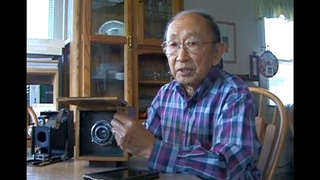Interviews
Role of the redress movement in helping Nisei to open up about their wartime experiences
When redress started, though, in the late '70s, or the idea started gaining momentum, then my parents started talking openly. I think, I mean, they talked very openly, they started talking more and more and more and more. And then when I got involved with Korematsu and the coram nobis cases with Hirabayashi and Yasui, too, my parents just would, you couldn't stop 'em after that. [Laughs]
I think they felt vindicated. At one point they felt, they realized—like a lotta Japanese Americans that I have talked to—once redress was either passed, not even passed, but when the movement went forward and they got used to the idea that, “Yeah, we were victims,” I saw a total loosening of the voices of Japanese Americans. They were able to speak again about the camps, and not in a—in a very, very strong way about how they felt. They were being, opened up about their feelings. They felt free to talk about one of the terrible things, some of the terrible things that happened to them.
Date: February 8, 2003
Location: Washington, US
Interviewer: Tom Ikeda, Margaret Chon
Contributed by: Denshō: The Japanese American Legacy Project.







